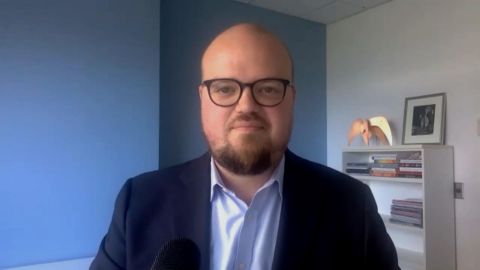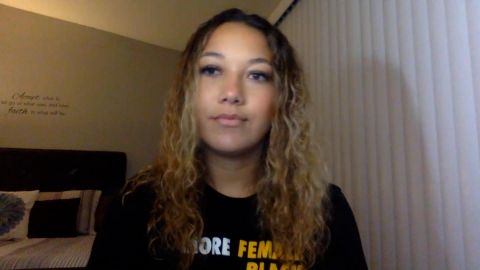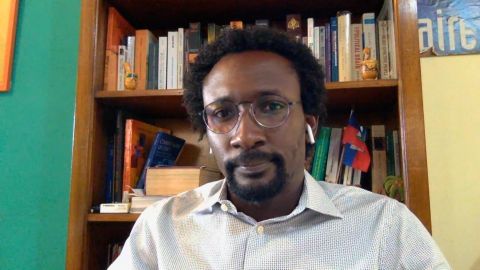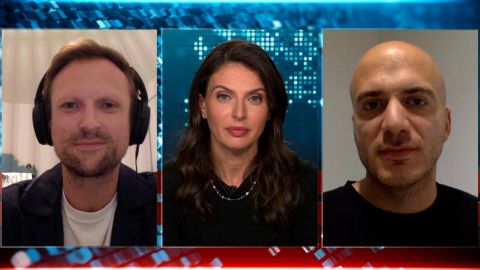Read Transcript EXPAND
BIANNA GOLODRYGA: We turn now to the secretive inner workings of America`s newspapers. Our next guest, journalist, McKay Coppins, investigated hedge fund, Alden Global Capital, and their years long work gutting newspapers. His latest piece with “The Atlantic” is titled “The Men Who are Killing America`s Newspapers.” Here he is talking with Hari Sreenivasan about how this all ends up hitting our communities the hardest.
(BEGIN VIDEO CLIP)
HARI SREENIVASAN, CNN INTERNATIONAL CORRESPONDENT: Bianna, Thanks. McKay Coppins, thanks for joining us. Your story took a look at a side of journalism that most people don`t think about and that is, who owns the papers and why? And when you look overall across the country, you`ll say, well, there`s hundreds of newspapers out there. What made you want to look at this particular story and these owners.
MCKAY COPPINS, Staff Writer, The Atlantic: Well, you know, part of it was having covered politics for about a decade. I`d become increasingly convinced a lot of the problems in our politics right now were rooted in the declining local news industry, right? When you look at the spread of misinformation and conspiracy theories, when you look at the erosion of civic trust, when you look at polarization, you can actually track a lot of those issues back to the lack of good information being supplied by trusted news sources that are based in communities where people live. And so, you know, this is a story a lot of people feel like they already know pretty well, right? You know that newspapers are dying. You know that it`s because Craigslist killed the classified section and Facebook and google swallowed up the ad market and local newspapers have failed to adapt to the internet essentially. And all of that is true to a certain extent. But what I found so interesting about these owners, Alden Capital, is that they are doing something kind of apart from those issues, right? They`re not trying to turn their newspapers into long-term sustainable businesses, at least according to my reporting. What they`re trying to do is buy up newspapers at bargain prices because many of them have been struggling for so long and then, milk them for cash in a way that maximizes profits for their investors in the short-term, almost indifferent to the long-term viability of these newspapers as businesses.
SREENIVASAN: Who are the investors? Who has their money?
COPPINS: That`s a great question and one I wish I had an answer to. All — hedge funds in general are known for their opacity. They tend not to disclose much about their investors if they can help it, but Alden Capital is especially known for its secrecy. Almost no information is known about Alden, or I`ll say it this way, Alden puts out very little information about itself. Its website contains no information beyond its name. Its founder, Randall Smith, hasn`t given an interview to the press since the mid-1980s. Alden operates with this preoccupation with secrecy, which a lot of people find ironic given that it`s one of the biggest employers of journalists in America. But we don`t know who the investors are. We do know that the co- founders of Alden Capital have done pretty well for themselves based on their spending over the last few years. Randall Smith, one of the co- founders, as of a few years ago, owned 16 mansions in Palm Beach alone.
SREENIVASAN: Give us a sense of scale. How many newspapers do they own?
COPPINS: Yes. As of now, Alden owns more than 200 newspapers. And that number includes a lot of smaller papers and places like Allentown, Pennsylvania, but it also includes the “Chicago Tribune,” `The Baltimore Sun,” ” New York “Daily News.” These are some of the most storied kind of iconic publications in the American news business. And they`ve been able to acquire them with remarkable ease, frankly. You know, in most cases, they don`t have any meaningful competition when they`re trying to buy these newspapers. In some cases, they`re able to buy them out of bankruptcy. The fact that the sector has been struggling for so long and the fact that the perception of this sector is means that they are able to swoop in when a newspaper chain is kind of down and out and immediately grab them at fairly low prices without really any friction or objection from most people beyond the reporters who work in the newsrooms.
SREENIVASAN: Now, you were able to catch up with one of the co-founders and kind of a rare interview when you confronted him with some of these critiques. What was his response?
COPPINS: Yes. So, I spoke to Heath Freeman who is the president of Alden Capital. And, you know, he made an argument that you would expect him to make, which is that a lot of these newspapers were either bankrupt or on the brink of bankruptcy when I bought them. They would have been liquidated if not for me. And so, you know, all of these complaints are kind of, you know, nonsense, right? But, you know, first of all, that`s debatable. Some of the newspapers certainly were troubled but that doesn`t mean they would be liquidated. And more recently, the newspapers they`ve bought have actually been profitable. The Tribune company was turning a profit before Alden bought it. So — and Alden still pursued an aggressive strategy of cost-cutting and profit maximization. But beyond that, I have to say in my interview with Heath Freeman, I didn`t get the sense he cared that much about his reputation for ruthlessness. In fact, he almost seems to wear it as a badge of honor. He made a point of distinguishing himself from the past generation of newspaper owners whom he believes were kind of saps and cowards, people who weren`t willing to make the tough decisions. What matters is the bottom line, right? They`re trying to make money for their investors and that`s all they care about. And so, you know, in my conversations with him, he made a kind of — he made a soft attempt at a defense but really, I did not get the sense he cares about Alden`s journalistic reputation.
SREENIVASAN: So, is there any specific animus towards this industry by the owners or, I mean, do they not like journalism? Why they don`t care about it or is there a reason that they got into this when you look back at the history of the ownership?
COPPINS: This is a point of debate among people who know the co-founders of Alden Capital. Some people say that they`re essentially indifferent to journalism and journalists and that they`re just pursuing their investment strategy. Others believe that they might actually have a kind of hostility toward the press, that if nothing else, is kind of a perk for them as they`re dismantling these local newspapers. Now, of course, they would deny that. But if you look at, for example, Randall Smith, he, you know, made a lot of money as an investor, but he, for a long time, had this kind of personal interest in the media sector. In the `90s, he used his own money to help his brother start an alt weekly newspaper in New York City called “The New York Press” whose defining kind of ethos was that it railed against the journalistic establishment. It was almost conceived of as a middle finger to the journalistic establishment. More recently, he`s moved to Palm Beach and become a major donor to Donald Trump`s presidential campaign. And so, there is a sense among some who have watched him over the years that he may actually see the dismantling of these newspapers as a perk to his investment strategy. As for Heath Freeman, he doesn`t visit his newspapers very often, even though he`s the president of this firm. But on the rare occasions that he does, he`s left somewhat the impression that he has kind of a casual contempt for the journalists who work there. He has said things like, what do all these people do? Once in a meeting, somebody told me that he suggested that all of Alden`s newspapers could get rid of their full-time reporters and rely on freelancing. There`s one story that circulated among Alden employees that maybe apocryphal but nobody could say for sure when the “Denver Post” won a Pulitzer Prize, Heath Freeman`s first response was, does that come with any money? And this just kind of gets at the perception, at least, within the newsrooms owned by Alden that Heath Freeman and Randall Smith, at — in the very best case, don`t care about journalism that much and in the worst case, actively have a certain amount of disdain for it.
SREENIVASAN: There was almost a movement a couple of years ago when the “Baltimore Sun” was up on the block. The reporters there didn`t want the sale to go through. They had seen what was happening to other newspapers owned by Alden. But what happened after that protest?
COPPINS: Yes. So, those reporters mounted a pretty impressive and aggressive campaign to block Alden from buying not just them but all the Tribune company papers. And, you know, they launched a PR campaign. They held rallies. They ran editorials. They tried to basically rally their communities against this hedge fund. And, you know, they got — they had some success. They found some people who wanted to look into buying the paper instead of Alden. They had local celebrities and politicians speak out. But at the end of the day, they struggled to marshal the kind of movement they would need to block a sale. And when push came to shove, the Tribune company board saw Alden`s bid as the best bid and they sold. And so, you know, I talked to a lot of the reporters who were involved this that effort and they were really discouraged. And, you know, some of them said, it felt like we were up against not just Alden Capital but capitalism itself. And as one reporter put it to me, am I going to win in a battle against capitalism in America? Probably not.
SREENIVASAN: You point out as well as other people that you spoke with in your piece that there is a reason to look at newspaper businesses or journalism companies differently than we think of, say, a donut chain or something else. That there is a public good and a consequence, if that local media watchdog is not present. Go over what is lost in community if a newspaper is bled dry and closes up.
COPPINS: Yes. I mean, there`s a huge body of research at this point that looks at what happens when a local newspaper vanishes. So, in a community where a local newspaper disappears or is dramatically gutted, voter turnout drops. Civic engagement is eroded. Polarization increases. Misinformation spreads more easily. There`s even some research that shows that city budgets balloon with the theory being that dysfunction and manipulation of public funds is able to happen more easily because there is no newsroom full of meddling reporters kind of looking into alleged corruption. And so, when you put these things together, you see that there are clear downstream effects to what Alden is doing to these local newspapers.
SREENIVASAN: You took us to, well, I guess, technically a newsroom in Vallejo, California, and you kind of showed us the story. What happened in that market? And as an example, what is the change that a reader would see? What are the stories they`re not seeing?
COPPINS: I spoke to a reporter at the “Vallejo Times Herald” who worked there from 2014 to about 2020. And he said when he first started, there was a staff of about a dozen reporters, editors and photographers covering this community of 120,000 people. He started out as a general assignment reporter and after a little while, one of his colleagues left and he was asked to start covering schools in addition to his other responsibilities. A few months after that, another colleague left and he had to pick up the city hall beat. After years of cuts by Alden, he was left as the only hard news reporter in town covering schools, city hall, businesses, hospitals, police, crime. This entire large city virtually by himself. You know, for this reporter, he told me that it was a really difficult time in his life because he wanted to get to everything. You know, he gained weight, started grinding his teeth, never took a vacation. He started spending his own money to pull court records. He was really trying to stay on top of everything, but he said it was impossible. He told me that he kept a notebook at his desk where he would write down tips that he got from sources, that he knew he would never have time to get to. And what that meant, essentially, was that there were stories that needed to be investigated, stories that mattered to taxpayers, mattered to locals, that he just never was able to look into. So, what happens is that, for a reader, for, you know, the average newspaper subscriber, it`s not just that your newspaper is getting slimmer. It`s not just that they`re running more stories from the “Associated Press.” It`s not just that you`re getting a worse product. It also means that the public officials that you elect and that you pay with your tax dollars are not being held to account the way that they once were when there were more robust local newspapers functioning.
SREENIVASAN: I also wonder, how much of this is our collective responsibility, that we have changed our behaviors in such a way, perhaps we consider news should be free or that we`re not supporting these local papers with our subscriptions. I mean, it seems like if there was enough interest in changing the course of this, that when it came time for some of these papers to go on sale that other benefactors would step up and fill that void, but it seems like these guys have deep pockets and they`re the only game in town sometimes to make the purchase.
COPPINS: Yes, I think that`s right. I mean, look, when I talk to the reporters at this kind of hollowed out newsrooms owned by this hedge fund, a lot of them would express dismay that the readers in the community didn`t think it was worth putting up more of a fuss when the prospect of Alden buying their newspaper was first reported, right? You know, there is this sense, I think, among the reporters that what they do is underappreciated, undervalued, that maybe, you know, if their readers understood the dynamics of media ownership, they would have tried to, you know, direct some of their energy towards stopping Alden from buying these newspapers. But I think what you`re getting at is a broader issue, which is that consumer behavior in the media world is just changed over the last decade or so, right? We`re much more used to getting our news from social media. We`re much more tuned in to national news and less tuned in to local news. The idea that we should have to pay for a local newspaper, I think, for a lot of people under the age of 40 or so, that seems kind of crazy to them, you know. And so, you combined all of these factors and the outcome is that there`s this sort of general apathy that Alden is able to take advantage of and gobble up these newspapers without anybody really noticing or caring.
SREENIVASAN: McKay Coppins of “The Atlantic,” thank you so much.
COPPINS: Thank you.
About This Episode EXPAND
Kaiya McCullough; Yvens Rumbold; Orlando von Einsiedel; Hassan Akkad; McKay Coppins
LEARN MORE



